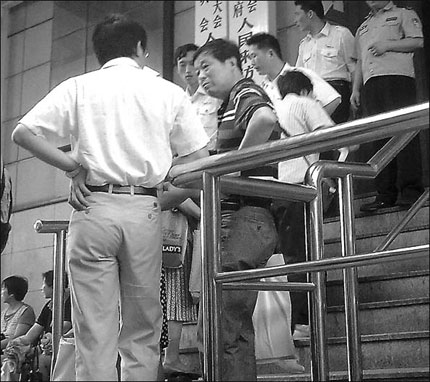Protesting at local government offices has become a part of Lin Tao's life after one of the buildings in his complex toppled over almost intact in June.
Lin and 24 other homeowners of Lotus Riverside residential complex in western suburban Minhang district hit the streets again yesterday, demanding government intervention in their compensation talks.
 |
|
Owners gather in front of the letters and complaints office of Shanghai, hoping the government will interfere with the issue of compensation. [China Daily] |
Zhang Jianping, sitting in front of the municipal government building at downtown People's Square, said the compensation offered by the property developer, Shanghai Meidu Real Estate Company, is too little compared to the average increase of Shanghai's soaring property price during in the period.
He said he believes "sanbu", which translates as taking a walk but is now more frequently used to refer to peaceful march by a group of protesters, will help force the developer to change the offer.
"Since the developer has been ignoring our requests, we have no other way but coming here to sanbu," he said. "And I feel the settlement process advances a bit every time after sanbu, which will arouse the attention of the local government who would then exert pressure to district government and the developer."
Lin Tao said he could not remember how many times he had protested at district and municipal government offices after the collapse on June 27, which killed one worker from Anhui Province. "That's the only thing I can do," said Lin, who had planned to marry his girlfriend and move into a new flat in the complex.
The remaining 10 buildings are still standing, but the homeowners believe they are unsafe.
Peaceful walking protests have increased in popularity after a protest of about 10,000 people against the building of a paraxylene factory in Xiamen, Fujian Province, which resulted in having the project moved.
Yu Hai, a professor with Fudan University who also co-founded the city's association on appeal to government through letters and calls, said it is a successful method when there is no other channel for people to communicate with government.
The country established its appeal-through-letter system, in the 1950s. A department at every government is set up to collect public complaints and deliver them to higher officials, according to Hu Xingdou, a professor with Beijing Institute of Technology.
But the department has no authority to solve the problem or supervise other departments to solve it, Yu said.
"Conflicts of interest are seen everywhere as people are being relocated, farmers lose their land and workers are laid off during State-owned enterprises (SOE) reform," Yu said.
"People are in need of channels to file their complaints to government and have problems solved."
The Internet covers most homes and an increasing number of people own mobile phones so participants are easily mobilized. In the Xiamen protest, the group was rallied by cellphone messages and Internet posts.
And people are more knowledgeable about laws and regulations to bargain during the negotiation, according to Yu.
"When they protest, they try to go to high level government, knowing in that way the situation could be pushed by pressure from senior officials," he said.
Compensation for homeowners in the collapsed building are calculated based on market price of August 13 and the offer made to homeowners of the 10 remaining buildings is based on that of June 27, when the building collapsed.
Zhang Pengfeng, a lawyer of local Minhang district government, who is coordinating talks between property developer and homeowners, said it is too early to talk about more compensation to homeowners of the uncollapsed buildings, and before those buildings have been proven unsafe.
Wang Laiyun, a homeowner of the collapsed building, said none of the homeowners in the collapsed building have accepted the compensation deals. But Zhang said half of them have accepted an offer.
Zhu Shunmin, a lawyer of the developer Meidu, said it is not possible to increase the compensation to homeowners of the uncolllapsed buildings.
(China Daily August 28, 2009)